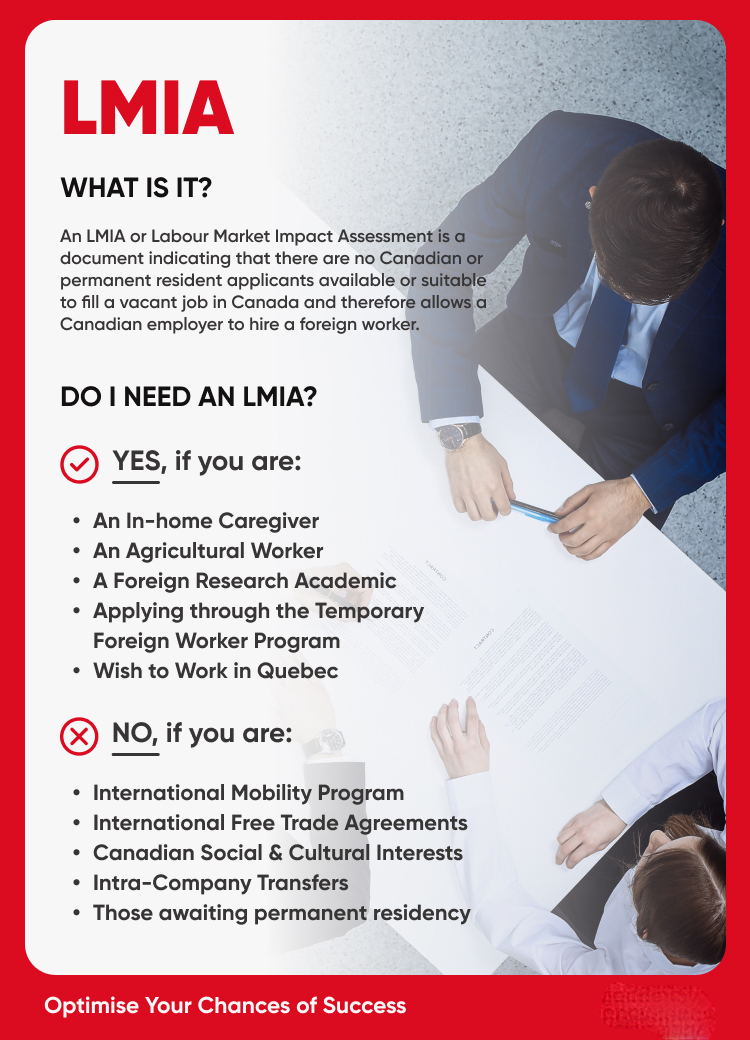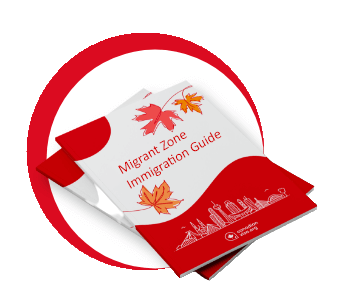Nearly 80% of immigrants who move to Canada and receive permanent residency status find employment but what of those who seek temporary employment? There are currently over 470,000 temporary foreign workers in Canada, predominantly finding employment in crop and animal production, accommodation and service industries, manufacturing and clothing sectors as well as in entertainment and recreation, the arts, and private households.
Programs that allow foreigners to live and work in Canada on a temporary basis usually require a Labour Market Impact Assessment (LMIA).
Some foreign workers are exempt from needing an LMIA, however, all streams that fall under the Temporary Foreign Worker Program (TFWP) require LMIAs as well as some other immigration programs which will allow applicants to claim points for having a job in Canada.
What Is a Labour Market Impact Assessment (LMIA)?
A Labour Market Impact Assessment (LMIA) is a document provided by the Employment and Social Development Canada (ESDC) to assess what kind of effects hiring international workers will have in Canada. The ESDC's main aim is to ensure that all Canadians have a higher quality of life by endorsing a highly-skilled, efficient and inclusive workforce to boost Canada’s labour market.
Once the ESDC has assessed whether or not it is viable to hire an international worker there will either be a positive or negative outcome.
A positive LMIA shows that an employer was unable to fill a particular job in Canada with a Canadian or a permanent resident that is suitable for the position.
A negative LMIA shows that there are sufficient Canadian or permanent resident candidates that are eligible to fill the vacant job position.
How Do I Apply for an LMIA?
The short answer is that you won’t have to. The onus is on your prospective employer to request an LMIA at least six months before the start date of your contract. Employers will have different application procedures depending on your wage and the median wage of the province or territory you will be working in. Low-wage positions will require more processes than high-wage positions.
Below is a list of median wages in each Canadian province/territory:
| Median Hourly Wage by Province or Territory | |
|---|---|
| Province/Territory | Median hourly Wage as of May 11, 2020 |
| Alberta | $27.28 |
| British Columbia | $25.00 |
| Manitoba | $21.60 |
| New Brunswick | $20.12 |
| Newfoundland and Labrador | $23.00 |
| Northwest Territories | $34.36 |
| Nova Scotia | $20.00 |
| Nunavut | $32.00 |
| Ontario | $24.04 |
| Prince Edward Island | $20.00 |
| Quebec | $23.08 |
| Saskatchewan | $24.55 |
| Yukon | $30.00 |
How Do I Get an LMIA job?
There are various streams and areas of employment that will require an LMIA:
- In-home Caregivers;
- Agricultural Workers;
- Foreign Research Academics;
- Temporary Foreign Worker Program applicants; and
- Those who want to work in Quebec.
What is an LMIA-Exemption?

An LMIA-exemption is when a Canadian employer does not need to apply for an LMIA when hiring a foreign worker. These are usually indexed and arranged through the International Mobility Program.
What is the International Mobility Program?
The International Mobility Program (IMP) allows Canadian employers to hire foreign workers without an LMIA under various programs. Unlike the Temporary Foreign Worker Program (TFWP), the IMP was designed to help foreign workers find their way to Canada to improve the economic and cultural development in a much broader sense.
Employers will need to meet the following requirements to hire foreign workers through the IMP:
- Prove that the job or worker meets the requirements for LMIA-exemption;
- Pay the compliance fee; and
- Submit an official job offer via the IMP Employer Portal.
Open Work Permits
There are certain work programs that do not require an LMIA due to the fact that it allows you to work for any employer in Canada and only require having an open work permit. These programs include:
- Post Graduation Work Permit Program;
- International Experience Canada (IEC);
- Inland Spousal Or Common-law Sponsorship Program; and
- Bridging Open Work Permit.
Global Talent Stream
The Global Talent Stream was designed to help bring highly skilled and specialized talent to Canada quickly through fast-tracked visa processing and boost Canada’s labour market to be able to compete on a global scale. As a result, employers hiring skilled workers under the GTS will automatically receive a positive LMIA. Employers will either need to apply through Category A, which requires being referred by a GTS partner, or through Category B which requires that the position to be filled appears on the specified list of occupations.
International Agreements
Canada also has various agreements with specific countries that allow foreign workers to accept job offers without needing a Labour Market Impact Assessment (LMIA). These Free Trade Agreements include:
- North American Free Trade Agreement;
- Canada-Chile FTA/Canada-Peru FTA/Canada-Columbia FTA/Canada-Korea FTA/;
- Canada-European Union Comprehensive Economic and Trade Agreement (CETA); and
- General Agreement On Trade In Services.
Canada Interest Exemptions
Canada also has a category whereby foreign nationals can fill jobs in Canada without an LMIA if it can be demonstrated that it will be a significant cultural or social benefit for Canadians. This will be reliant on the applicants' past successes, recommendations and testimonials from those in a relevant field of expertise.
Intra-Company Transfers
If the company you are working for in your home country or outside of Canada wants to transfer you to a branch in Canada, you may also be exempt from an LMIA application.
Humanitarian and Compassionate LMIA-Exemptions
Canada is one of the countries that offer refuge to people who want to move to Canada and start a new life. In these exceptional cases, the government will review your application and could grant an LMIA exemption.
Facilitated LMIA - Quebec
Quebec has its own immigration processing system that is different from the federal immigration processes, so it stands to reason that its LMIA processing procedure differs slightly. Quebec employers will need to adhere to the following procedures:
- Submit application in French except for In-Home Caregivers;
- No job advertising requirements or proof of an attempt to hire a Candian citizen or permanent resident needed;
- Only high demand where there are labour market shortage may be eligible; and
- LMIA application must be approved by federal (ESDC) and provincial (Ministère de l’Immigration, de la Diversité et de l’Inclusion (MIDI) authorities.
What Happens Once My LMIA is Approved?
If a Labour Market Impact Assessment is approved or deemed positive it will be valid for 6 months. Sometimes an LMIA may be approved in as little as 10 days. You will then be notified by your employer to say that you can apply for your work permit or permanent residency. It is important to ensure that you receive a copy of the LMIA and job offer from your employer as you will need it when you apply for your work permit.
Ready to Get to Work?

Before starting on your Canadian journey, it’s important to know whether or not you will need an LMIA or not. As outlined above, various programs and immigration categories are on offer for temporary foreign workers who are just as much an integral part of the development and growth of the Canadian economy as permanent residents and citizens are.
Once your Labour Market Impact Assessment (LMIA) has been approved and you have your official job offer you’ll need to apply for your Canadian work permit. Requirements may differ slightly from program to program as well as if you are applying for work in the province of Quebec.
Need help with your application to work in Canada?
Simply click the link below to speak to one of our highly qualified consultants for more information about the Labour Market Impact Assessment, as well as the visa and work permit application process.
LMIA Requirements
The LMIA application process can be quite labour intensive and needs a lot of detailed supporting documents. Your employer will have to meet the following requirements to receive a positive LMIA:
1. Show that they could not fill the job locally
Your employer must have advertised the vacant position for a minimum of 4 consecutive weeks in the last three months before applying for an LMIA. This should be done on the Government jobsite, JobBank. You can submit invoices from paid job platforms or supporting copies and documents as proof.
2. Develop a transition plan or a labour market benefits plan
Your employers must produce a transition plan which will need to be submitted with your LMIA application. A transition plan should describe in detail what attempts the employer plans to undertake to recruit, retain, and train Canadians and permanent residents to reduce their reliance on the TFWP. For highly skilled positions, like those that fall under the Global Talent Stream, employers must develop a labour market benefits plan that describes how hiring a highly-skilled foreign worker will benefit the Canadian labour market.
Exemptions include:
- Caregivers
- Position under the Seasonal Agricultural Worker Program and the Agricultural Stream
- Jobs in Canada that are time-limited in nature such as emergency repair work
- Unique skills that very few people possess such as senior managers under skills level 00
3. Draw up an employment contract
An employment contract must be prepared and signed by the employer and the temporary foreign worker to ensure that all parties involved are aware of their rights and obligations. The temporary foreign worker must sign it before arriving in Canada.
4. Meet additional requirements for low-wage positions
Additional work benefits like transportation, affordable housing, and healthcare must be arranged and provided for low-wage foreign workers. The ESDC may conduct inspections to ensure employers adhere to these requirements.
5. Pay the LMIA application fees
Employers must pay a CAD $1,000 professing fee for the Labour Market Impact Assessment application. Employers may be exempt from paying the application fee if they are hiring through the Caregiver Stream and the Agriculture Worker Streams. An LMIA is valid for six months after it is issued to a Canadian employer.
What's Next?
Now that you have your LMIA, you will be able to apply for your Canadian work visa. You will need the following documents to apply:
- Your job offer letter
- Your employment contract
- A copy of the LMIA; and
- Your LMIA number
For more information on the Labour Market Impact Assessment and how to apply, visit our easy LMIA guide.




